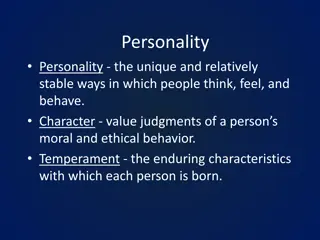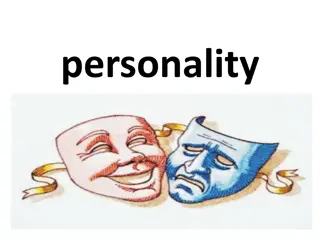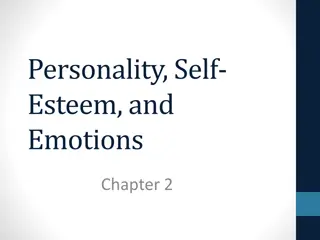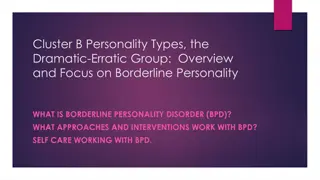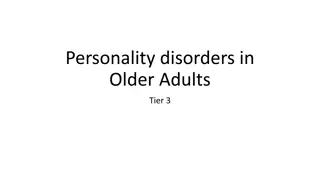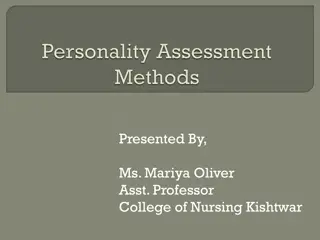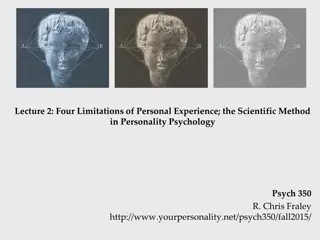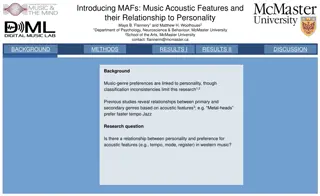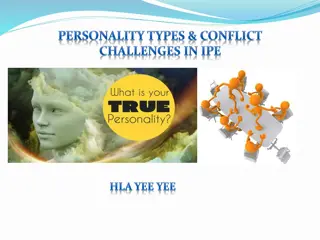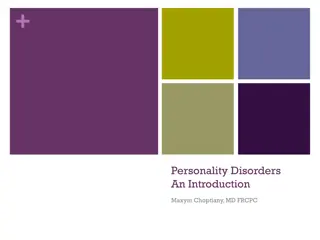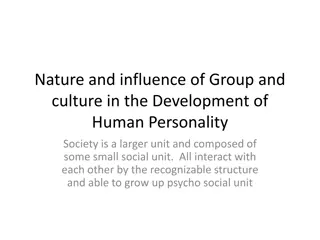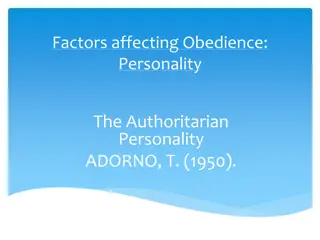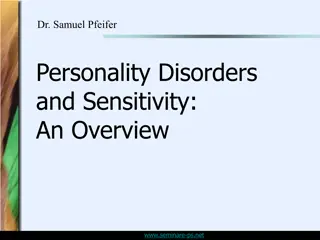Understanding Personality: The Dynamic Organization Within Individuals
Personality, derived from the Latin word "Persona," encompasses the psychological systems shaping an individual's unique adjustment to the environment. It influences how a person interacts with others, perceives themselves, and displays a pattern of inner and outer traits. Personality integrates various attributes to give life meaning, with determinants including heredity, environment, and societal factors. Theories like Freud's psychoanalytical theory and Jung's collective unconscious further explore the depths of personality development.
Download Presentation

Please find below an Image/Link to download the presentation.
The content on the website is provided AS IS for your information and personal use only. It may not be sold, licensed, or shared on other websites without obtaining consent from the author. Download presentation by click this link. If you encounter any issues during the download, it is possible that the publisher has removed the file from their server.
E N D
Presentation Transcript
Personality Latin word Persona means speak through Definition: It is the dynamic organisation within the individual of those psychological systems that determine his unique adjustment to his environment - Gordon Allport It is how a person affects others and how he understands and views himself as well as the pattern of inner and outer measureable traits and the person-situation interaction Fred Luthens Personality represents the sum total of several attributes which manifest themselves in an individual to organise and integrate all the qualities so as to give meaning to life, and the uniqueness of the situation which influences behaviour of an individual.
Characteristics of personality: Acc. to Bonner, Personality is a diverse psychological concept. Human behaviour is composed of acts. Personality visualised as a whole actualises itself in a particular environment. It is distinguished by self consistency. It forms a time-integrating structure. It is goal directed behaviour. It is a process of becoming.
Determinants of Personality: Heredity: Physical Mental Culture Family Personality Heredity Environment Social Family: Socio eco. Level Size & Birth order Religion and race Education Geo. location Situational
Theories of Personality: Sigmund Freud s Psycho analytical theory: Based on the concept of unconscious nature of personality. Major force that motivates a human is his unconscious framework which include, The ID-foundation of unconscious behaviour that seeks immediate satisfaction of biological or instinctual needs. The EGO- associated with the realities of life which is conscious part of human personality. The Super EGO-higher level conscious force which restrain the Id. Person with balanced behaviour wins the race.
Carl Jungs Psycho-Analytical Theory: There is collective unconsciousness that exists in personality which is deeper and includes the cumulative experiences of all the past experiences of all the past generations. Erikson s eight developmental stages: From childhood to adulthood. 1. Infancy: Trust Vs Mistrust 2. Early childhood: Autonomy Vs Shame and Doubt 3. Play age: Initiative Vs Guilt 4. School age: Industry Vs Inferiority 5. Adolescence: Identity Vs Role Diffusion 6. Early Adulthood: Intimacy Vs Isolation 7. Adulthood: Generativity Vs Stagnation 8. Mature Adulthood: Ego Integrity Vs Despair
Chris Argyriss Immaturity-Maturity theory: Human personality rather than going through precise stages, progresses along a continuum from immaturity as an infant to maturity as an adult. Immaturity Characters Maturity Characters Passivity Dependence Few ways of behaving Shallow interests Short time perspective Subordinate position Lack of self awareness Activity Independence Diverse behaviour Deep interests Long time perspective Super ordinate position Self awareness and control
Traits Theory: It gives emphasis to quantitative aspects i.e, psychological characteristics called traits. It proposes that an individual may be described in terms of a constellation of traits such as affiliation, achievement, anxiety, aggression and dependency. A trait is any distinguishing relatively enduring way in which one individual differs from another. D W Fiske has generalised five basic traits: 1) Social adaptability 2) emotional control 3) conformity 4) inquiring intellect and 5) confident self expression.
Allports trait theory is based upon the distinction between common traits based on values and personal dispositions based on unique traits. Cattell identified two categories of traits 35 surface and 16 source traits or primary traits. 16 personality traits having two dimensions are constant and enduring, allowing prediction of human behaviour. Self Theory developed by Clifford T. Morgan has two sets of meanings: 1) Self concept/Self image 2) Self as a process
Carl Rogers defines self concept plays a very significant role which includes, Self image Ideal self Looking glass self Real self Big Five personality traits: Extraversion Emotional stability Agreeableness Conscientiousness Openness.
Other major personality traits influencing OB are, Authoritarianism Bureaucratic personality Machiavellianism Introversion and Extraversion Problem solving style Achievement orientation Locus of Control Self Esteem Self monitoring Risk taking Type A and Type B personality Myers- Briggs Type Indicator(MBTI)



